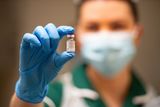Pfizer will pivot to cancer drugs, chief executive Albert Bourla tells IDA event
He says Irish manufacturing has a ‘clear role in the battle’


Pfizer is pivoting from Covid to cancer, and putting most of its resources into oncology, its CEO has said. Albert Bourla told an event hosted by IDA Ireland in Dublin that all the money his company made from Covid vaccines will be reinvested in technology to fight cancer.
"I see a clear role for Irish manufacturing in this battle because here we have our largest manufacturing capacity in the world,” Dr Bourla told over 500 people at the National Concert Hall, after receiving an award from Taoiseach Leo Varadkar in recognition of Pfizer’s 54-year presence in Ireland.
The pharmaceutical company employs over 5,000 people across Dublin, Kildare and Cork, and earlier this year it announced plans to spend more than €1.2bn increasing its manufacturing capacity at Grange Castle. However last month the company also signalled that up to 100 jobs will be lost at its manufacturing plant in Newbridge, following reduced sales of its Paxlovid Covid antiviral medicine.
Dr Bourla said that Pfizer’s commitment to Ireland remains steadfast, and it looked forward to seeing the completion of recent investments which would ensure the company was ready to manufacture the next wave of medical innovations.
"Nothing scares people all over the world more than cancer, because it affects everyone,” the Pfizer CEO said. “I hope we will be successful in our mission. I am optimistic that in the next 10 years, we will see significant advancement.”
Pfizer’s research is focused on Antibody Drug Conjugate (ADC), medicines that are designed to kill tumour cells while leaving healthy ones alone. Dr Bourla said the aim is to create a basic technology platform, and then “by changing the antibody or the drug, you can target breast cancer, brain cancer, cancer of the bladder or the liver”.
Asked what his company had learned from Covid, Dr Bourla said that it showed “the power of science in the hands of the private sector in collaboration with academics, regulators and governments around the world”. Without a thriving life sciences industry prepared to find a solution to an existential threat for human civilization, “we wouldn’t be here”.
Presenting the award, the Taoiseach said Pfizer was one of the first international companies to locate a substantial manufacturing operation here, and was part of a fundamental change in our national story. “I think perhaps you saw something in Ireland that we did not see in ourselves,” Mr Varadkar said..
Noting that Ireland is now home to eight of the top 10 pharmaceutical companies ranked by revenue, and that the sector accounts for exports of over €100bn a year, Mr Varadkar pledged that the government would work to provide a stable and attractive place for people to start and scale up businesses.
"We’re overhauling our planning system, and increasing resources in our planning and regulatory bodies, ranging from additional staff to the appointment of new judges with special expertise in the planning environment,” he said.
Michael Lohan, CEO at IDA Ireland, acknowledged the recent decline in exports from the life sciences sector, which employs about 100,000 people across 250 state-supported companies, but said this was reflective of the global market and a correction after Covid. He predicted export levels would return to where they were before the pandemic, with more “measured growth”.














.jpg)

